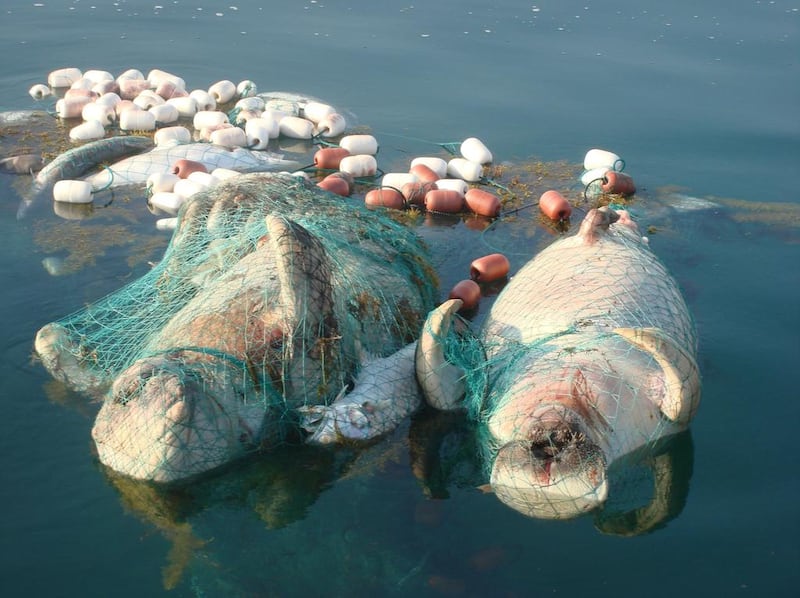Seven out of 10 nets used by local fisherman are illegal, with the potential to kill marine wildlife, a snap inspection by environment inspectors has uncovered.
Officers from the Environment Agency Abu Dhabi swooped on locations used by commercial and recreational fishing boats after the discovery of five dead dugongs, including a pregnant female, on Saadiyat Public Beach last month.
The inspectors, who arrived unannounced, uncovered widespread use of hiyali nets, which are banned under federal law and are easily lost at sea, ensnaring wildlife.
They also found 225 private and commercial fishing boats, which the agency describes as being “out of service”.
The agency took what it says were “extensive and unannounced inspections” after the drowning deaths of the protected species, in what is believed to be the worst incident of its kind in the UAE.
Working with maritime inspectors from the Critical Infrastructure and Coastal Protection Authority, teams covered about 7,000 kilometres, or 14 per cent of the Abu Dhabi coastline, in just 36 hours.
They found three more dead dugongs in Al Dhafra to the west of the capital, and more than 2,000 metres of nylon fishing nets abandoned by fishermen in the water.
At least 10 fishing nets, known as gargoor, that did not meet legal requirements were confiscated, with four offences lodged for using nylon nets and unlicensed recreational fishing boats.
Dr Shaikha Al Dhaheri, executive director of terrestrial and marine biodiversity at the agency, called for “immediate and deterrent action" against offenders.
"In spite of strict recreational and commercial fishing rules and regulations in the emirate, effective management of our marine reserves and the great efforts made by other relevant authorities, the use of illegal and banned fishing gear and methods is still causing the death of dugongs, dolphins and turtles and other marine species,” Dr Al Dhaheri said.
She has called the dugong deaths on Saadiyat “a harsh blow to one of Abu Dhabi’s most vulnerable species”.
________________
Read more:
Five dugongs wash up on Saadiyat beach in 'harsh blow' for the species
Call for coordinated effort among Gulf countries to save dugong
________________
Hiyali are drift nets that hang vertically in the water, using weights, and can be up to seven metres long. They are banned in many territorial waters around the world because of their destructive impact on fish stocks and marine animals.
Fish become entangled in the mesh, as do other wildlife like sharks, dolphins, and even seabirds.
In the UAE they are used to catch kingfish and Indian mackerel, local species of mackerel with consumers but declining in numbers because of overfishing. The season lasts from January to May, coinciding with the dugong fatalities.
According to Fadel Obaid, of the Umm Al Quwain fishing association, the nets need at least a kilometre of sea to work well.
“In Abu Dhabi there’s a strong possibility the net will draw near islands,” he said. “This can cause problems as it drifts with the tide.”
Laws on net use should be clear, said Mr Obaid.
“It’s very important to clarify these things because there are those who fish for a hobby and those who depend on God and the sea for a living.”
Arabella Willing, resident marine biologist and head of conservation at the Park Hyatt, Abu Dhabi performed post mortem examinations on the Saadiyat dugongs.
She described the banned drift nets as: "problematic and dangerous to wildlife” adding that she hoped greater awareness of the problem would promote “a general community feeling of taking care of the environment and being more mindful".
At least ten fishing nets of a traditional domed design known as gargoor did not meet legal requirements and were confiscated during the inspections, with four violation reports issued for using nylon nets and unlicensed recreational fishing boats.
Those convicted face hefty fines and prison sentences. For first offenders this is up to Dh50,000 with the possibility of a minimum three months behind bars. This rises to a maximum of Dh100,000 and a minimum of one year in prison for subsequent offences.
The areas inspected included the Eastern Mangrove Marina to Ras Haniora in Al Taweelah, the canals and khors around Al Saadiyat and Ras Ghurab Islands, Al Sadar Port, Al Bahya and Al Shilila areas.
A second group of inspectors covered the Al Dhafra region, including Al Radeem, Al Mugharah, Al Mirfa, Khor Al Bazam and Al Haramiyah.
The third group started from Al Sila Port covering Al Hamra, Shuweihat, Al Silaa, Doha Al Nakheel and Doha Tolab up to Ras Ghamis.
The UAE is home to an estimated 3,000 dugongs, the world’s second largest population.
The aquatic mammals are protected under Federal Laws No 23 and No 24, and the UAE is a signatory to the UN Convention on the Conservation of Migratory Species making it an international commitment to protect dugongs.






